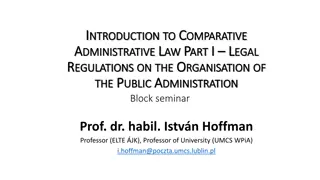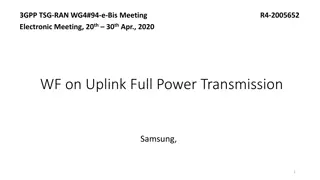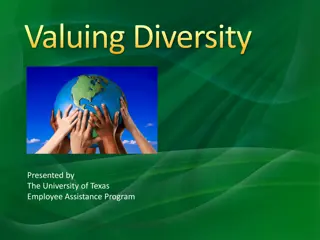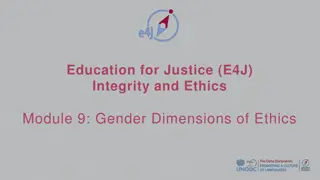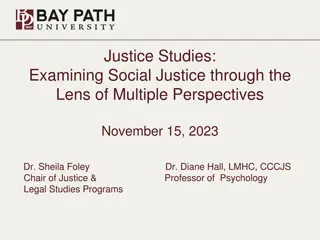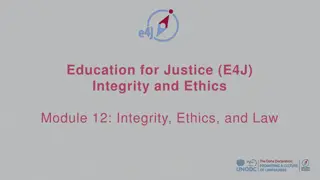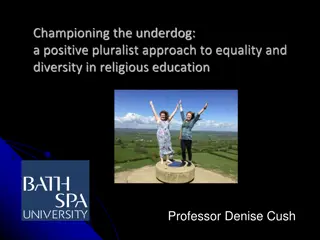Ethics, Diversity, and Pluralism in Education for Justice Module
Explore the significance of ethics, diversity, and pluralism in Module 5 of the Education for Justice (E4J) program. Delve into topics such as tolerance, moral role models, intersectionality, and the acceptance of differences. Understand how diversity can lead to both negative and positive outcomes, and reflect on personal experiences of discrimination, tolerance, and pluralism.
Download Presentation

Please find below an Image/Link to download the presentation.
The content on the website is provided AS IS for your information and personal use only. It may not be sold, licensed, or shared on other websites without obtaining consent from the author. Download presentation by click this link. If you encounter any issues during the download, it is possible that the publisher has removed the file from their server.
E N D
Presentation Transcript
Education for Justice (E4J) Integrity and Ethics Module 5: Ethics, Diversity and Pluralism
Agenda Ethics, Diversity and Pluralism (60 minutes) Diversity, heritage and identity (20 min) Ethical role models and their relevance (60 min) Intersectional Constitution exercise (30 min) Summary (10 min)
Learning Outcomes Upon completion of this module students should be able to: Understand and define diversity, tolerance and pluralism. Perceive the value of cultures, identities, histories, and points of view other than one s own. Provide examples of moral role models whose actions promote the values of tolerance and pluralism. Demonstrate a preliminary understanding of more complex aspects of diversity such as intersectionality, identity and subcultures.
Ethics, Diversity and Pluralism Diversity The existence of difference among social groups Can lead to negative outcomes intolerance and prejudice Can lead to positive outcomes such as inclusion
Ethics, Diversity and Pluralism Tolerance The capacity to endure opinions or beliefs with which one disagrees A political principle (or virtue) in which we are obligated to respect differences A liberal idea
Ethics, Diversity and Pluralism Pluralism Pluralism is more than toleration Pluralism is the acceptance and celebration of differences Pluralism is a moral and political position Pluralism as a political concept Pragmatist philosophy John Dewey American political science interest groups and democracy European Legal theory constitutional and legal
Ethics, Diversity and Pluralism Are societies improved through diversity or do they suffer because of the conflicts that arise? What is the difference between tolerance and pluralism? What experiences of discrimination have students experienced in their own lives? What experiences of tolerance have students experienced in their own lives? What experiences of pluralism have students experienced in their own lives?
Ethics, Diversity and Pluralism Exercise 1: I am Malala Can diversity principles ignore the teachings of prevailing local religions that in this case might encourage discrimination against girls and women? What can Malala s father s behaviour tell us about diversity, tolerance and pluralism?
Diversity, heritage and identity Exercise 2: The DNA Journey
Ethical role models and their relevance Neil MacGregor on the Cyrus Cylinder: A great moment for the Middle East
Ethical role models and their relevance Exercise 3: Mandela s The Long Walk to Freedom In the excerpt you have just read, how do we make judgments about their behaviour? Is either person morally correct? Or are both of them right in their own way ? How might you have handled the problems based upon race, role, and age emphasized in this excerpt? Are educational courses like this one an antidote to racism or does higher education embalm and transmit eternal problems of human nature which cannot be changed in diversity and ethics courses? How important and practical is what we are doing in this class?
Intersectional Constitution exercise Exercise 4: Role Play Hindu activist from India Chinese Communist party member American transgender activist Palestinian Hamas leader Venezuelan Catholic liberation theologian Any other role that would be relevant in that particular context
Core reading Anita Foeman (2017). DNA tests, and sometimes surprising results. The New York Times, 20 April. Available from https://www.nytimes.com/2017/04/23/us/dna-ancestry-race-identity.html British Museum (2017). The Cyrus Cylinder. Available from http://britishmuseum.org/research/collection_online/collection_object_details.aspx?objectId=327 188&partId=1 Mandela, Nelson. (1994) Long Walk to Freedom. New York: Little, Brown & Company Yousafzai, Malala (2013). I am Malala: The Girl Who Stood up For Education and Was Shot by the Taliban. New York: Little Brown and Company. Gandhi, Mohandas (1957). Gandhi, An Autobiography. My Experiments with the Truth. Boston: Beacon Press.












